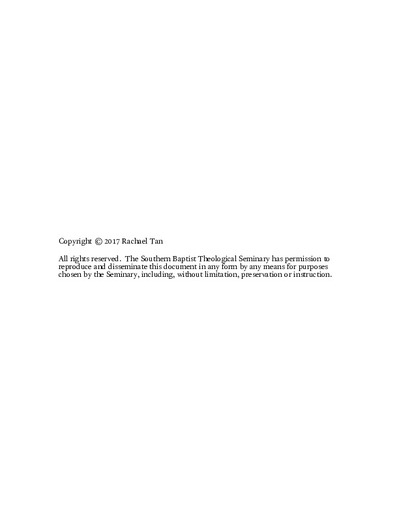Conformity to Christ: An Exegetical and Theological Analysis of Paul's Perspective on Humiliation and Exaltation in Philippians 2:5-11
Subject
Bible. Philippians, II, 5-11--Criticism, interpretation, etc.Humiliation--Biblical teaching
Abstract
This dissertation presents a threefold thesis. First, Paul is presenting a parallel in Philippians 3:7-11 from his own life by echoing back to Christ’s life and ministry in Philippians 2:5-11. Second, the theme of conformity to Christ is foremost in Paul’s mind as he contemplates on Christ’s humiliation and exaltation. Third, it is common to pit the two main streams of interpretation (kerygmatic and ethical) for these two Philippian passages against each other. I argue that this is a false dichotomy and it is best to integrate both theology and ethics in interpreting both passages.
Chapter 1 serves as the introduction to the dissertation. It states the problem that the relationship between Philippians 2:5-11 and Philippians 3:7-11 has not been given due attention. It provides an overview of the history of interpretation on the topic. It also presents the threefold thesis and the method of research.
Chapter 2 consists of an exegetical study of Philippians 2:5-11. It also includes a preliminary discussion on the literary background of the hymn and the immediate and broader contexts of the pericope. The semantic analysis involves an in-depth study of four key terms which are crucial in understanding the concept of Christocentric perspective. The syntactical analysis examines the passage in detail with focus on the grammatical and syntactical relationship of words, phrases, and clauses in each verse.
Chapter 3 presents the theological reflections from the exegetical analysis in chapter 2. The discussion centers on three important themes, namely, Christocentric ethics, conformity to Christ, and humiliation-exaltation motif.
Chapter 4 focuses on an exegetical and theological analysis of Philippians 3:7-11. A brief overview of the issue of the letter’s literary integrity, immediate and broader contexts of the passage, and the correspondence between Philippians 2:5-11 and 3:7-11 is first presented. This is followed by an exegetical study of the passage. The theological reflections include three themes, namely, supreme lordship of Christ, conformity to Christ, power and participation in Christ.
Chapter 5 integrates the theological reflections from chapters 4 and 5. It also gives the conclusion of the dissertation with suggestions for further areas of research.

